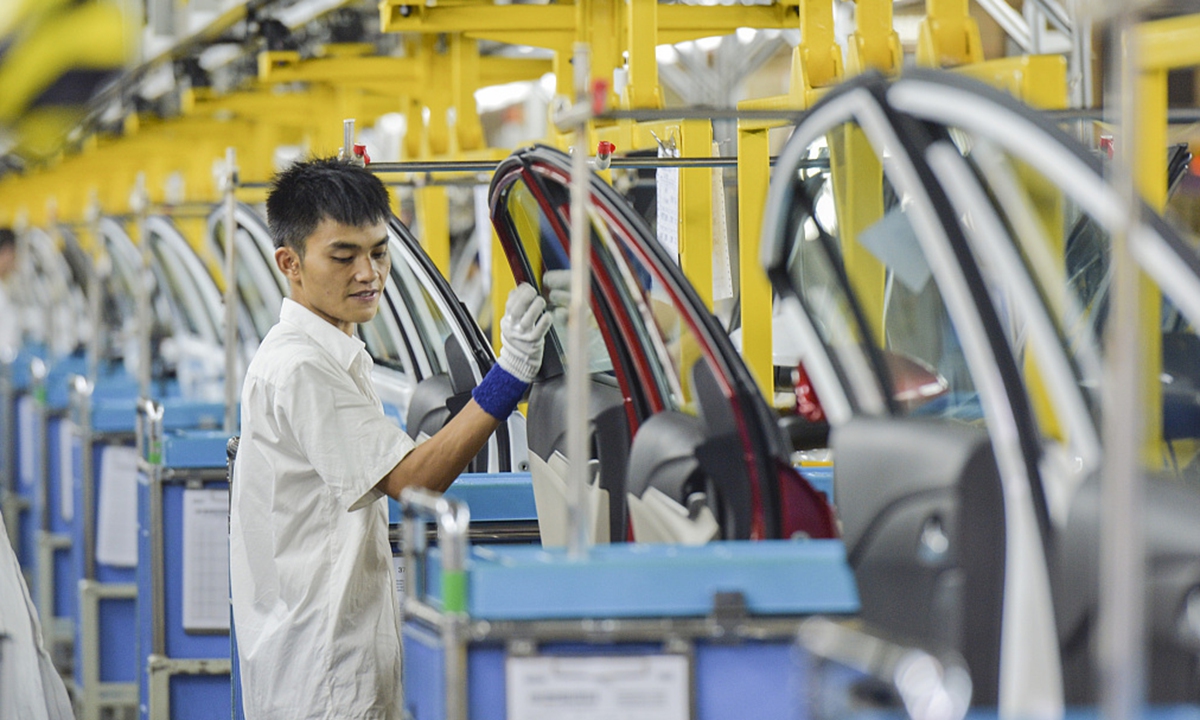
PMI File photo:VCG
The private Caixin manufacturing purchasing managers' index (PMI) came in at 50.4 in July, remaining in expansion territory but lower than the reading of 51.7 in June, due to weak demand, according to the survey.Analysts said that the PMI data showed that the foundation of the expected manufacturing recovery is fragile, calling for an accelerated implementation of existing pro-growth policies in the third quarter, which will be a key window for China's economic recovery.
The Caixin PMI trend is in line with the official PMI data released on Sunday. The official manufacturing PMI came in at 49 in July, falling into contraction range after expanding at 50.2 in June, data from the National Bureau of Statistics showed on Sunday.
A reading above 50 indicates expansion, while a reading below 50 reflects contraction.
The recovery of manufacturing activity slowed in July due to overall weak demand, rising cost of energy and other raw materials and short-term heat waves, Zhou Maohua, a macroeconomic analyst at Everbright Bank, told the Global Times on Monday.
Both indexes for production and new orders declined from the previous months. Companies surveyed by Caixin said weak market demand, the continued impact of the pandemic and power shortages constrained industrial growth.
The manufacturing employment index for July came in at the lowest since May 2020 as companies cut costs and grappled with sluggish sales, according to the survey.
On the bright side, new export orders continued June's expansion trend, as external demand remained stable. Separate data also showed an increase in new orders for consumer and investment goods.
Wang Zhe, a senior economist at Caixin Insight Group, said that main macroeconomic indicators in the second quarter showed that the short-term impact of the pandemic on the economy had subsided, and the third quarter will be an important window for a recovery.
"The authorities have sent signals that no big stimulus is forthcoming, so speeding up the implementation of existing pro-growth policies would be a pragmatic way to shore up the economy in the third quarter, which is an important window for a recovery," Wang said.
China has refrained from resorting to a deluge of stimulus money to propel growth. A meeting of top leaders on Thursday called for expanding domestic demand in the second half of the year, keeping employment and prices stable, and ensuring that the economy runs within an appropriate growth range.
The State Council, China's cabinet, announced on Saturday that it will carry out a nationwide inspection across 19 provinces to speed up implementation of policies to stabilize growth, market entities, employment, supply chains.
To boost growth, the authorities have increased tax rebates, accelerated issuance of local government special-purpose bonds, and lowered car purchase taxes, in a package of 33 measures announced earlier this year.
"Policies such as ensuring supply and price stability, bailing out troubled enterprises and stabilizing growth will help reduce business pressure and improve corporate profitability. As domestic demand gradually recovers, it is expected to lead to an expansion in manufacturing output and help the labor market improve," Zhou said.

